Afriqiyah Airways: Strategy and Outlook for the Second Largest Airlines in Libya
Abubaker M. Elfortia, General Manager of Afriqiyah Airways
Since the revolution Afriqiyah Airways has received two new Airbus 320 aircrafts and we will get another Airbus 330 in October at the end of this year. Next year we will get another two A330s and we have signed a contract with the airports for ten A350 aircrafts.
Interview with Abubaker M. Elfortia, General Manager of Afriqiyah Airlines
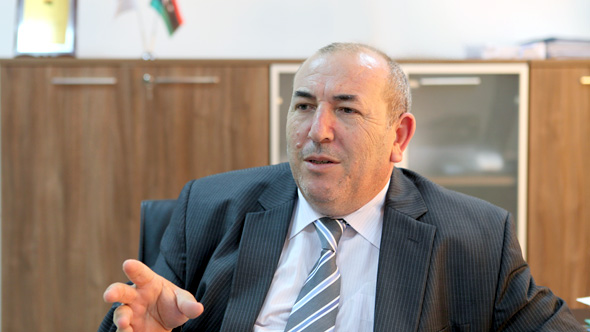
What are the expansion plans for Afriqiyah Airways?
Since the revolution Afriqiyah Airways has received two new Airbus 320 aircrafts and we will get another Airbus 330 in October at the end of this year. Next year we will get another two A330s and we have signed a contract with the airports for ten A350 aircrafts.
What is your expansion strategy in Africa?
We are not yet completely back to running our entire network, we are just operating some of our destinations. We are hoping to return to full operations soon because the African destinations are part of the obligation to Europe. The suspension of operations to Europe using our own aircrafts has created an obstacle for us returning to full operations.
We estimate that maybe about 15 million people travel from Africa to Asia and Europe. Libya is in the center of Africa so I think there is a lot of potential for Libya to be a transport hub.
Is this suspension fully justified or do you think this is an unfounded criticism?
The suspension was really relevant to the ex-Minister for Transport. I think that it’s not justified for us as an airline, I feel that the standard of our airline is good enough to fly to Europe, we have brand new aircrafts, our crew is trained in high standard training centers in Europe etc. The sanction is to do with the civil aviation authority in Libya and not with our airline in particular.
What about the security issues that they are worried about? Are you fully compliant with the international standards?
Yes, we are fully compliant with the international standards, and we are operating from the same airport that all other airlines operate from. There are European airlines that operate from the same airport, using the same facilities and logistics as us. So there is no difference between Afriqiyah Airlines or any other as we are operating from the same airports.
In terms of expansion plans, what are your growth targets for 2013 and 2014? What are your expectations for the future?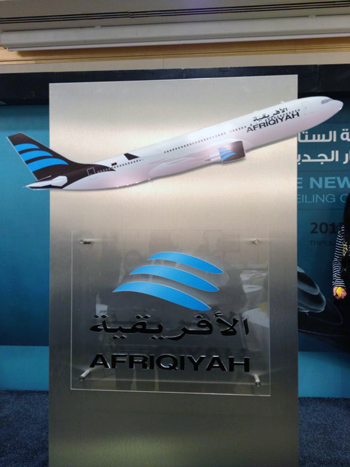
I think that there will be great potential here in Libya. I think with the amount of construction and work going on here this will surely be accompanied by many people being transferred from Libya to other countries. We expect that we will have a good share of transporting both passengers and cargo. We are going to start to expand our destinations to other European countries and also to the United States.
Do you feel that Libya can be competitive with other countries such as Morocco, Egypt or the Gulf countries as a transshipment hub?
Now we finally have the chance to be competitive, because we have full support from our Ministry of Transport, from the other Ministries and from the Prime Minister to be upgraded and to be competitive. I think that we have a really good chance at being competitive; we just need to work hard, concentrate on our training and upgrade our services. Our airline outsources a lot of it services so we hope that all the service companies will also be upgraded together.
In terms of Libya’s geographical location, does this offer any kind of advantage?
We estimate that maybe about 15 million people travel from Africa to Asia and Europe. Libya is in the center of Africa so I think there is a lot of potential for Libya to be a transport hub.
Can you shed more details on your recent figures, how many people do you transport, what is your market share domestically etc.?
We started to record data last year but these figures don’t really reflect the reality because last year was the very first year that we started after the revolution. The figures will not be realistic because we are not yet fully operational. We only started flying to some destinations in the second half of the year and some aircrafts were grounded because of some damage during the war.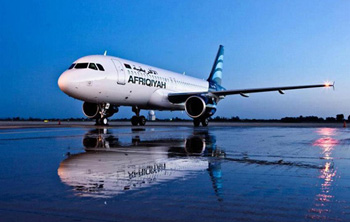
However, the number of passengers that we transferred during those months of 2012 was about 600,000 passengers and we operated about 5,500 flights altogether.
Are you going to be looking to expand to new destinations?
Yes, actually tomorrow we will operate our first flight to Miami; hopefully this will be connected to Paris soon. We will increase our frequent flights to London and Rome; we already have 2 flights a week to Rome and 3 flights a week to London. We are hoping to have a daily flight to London so that we can connect London and Paris via Tripoli to other destinations in Africa.
At the moment you are doing this by leasing aircraft from Moldova airlines?
Yes. We have an aircraft leased from Moldova.
But in the future would you use your own aircraft?
In the future we hope to operate with our own aircraft but at the moment we probably need at least two leased aircrafts to operate our network to Europe.
What kind of growth do you expect for the airline in the next few years?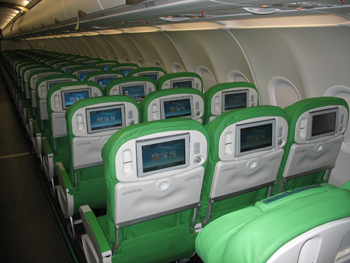
I think that the strategy from our private company and from the government will help us to improve our services. We hope to operate more as a partnership with Libyan Airlines, with more coordination between the two companies. At the moment and in the past, we have been working as competitors, but the aim is to work as partners. This will help a lot; as maybe the network will be shared between us.
So you are looking for at least double digit growth?
I hope so.
In terms of the management style and culture in the company, how would you define this at Afriqiyah Airlines? Libya has traditionally been known for having lots of bureaucracy during the Gaddafi years. Do you feel that the management structure in the company is changing because of the revolution? Do you see that the private sector influences efficiency?
Well, this bureaucracy has existed here for 40 years, which is not a short amount of time. It takes time to change it; I don’t think it can be done as quickly as we would like it to. We are working on it, but I think that training, efficiency will change it, giving a chance to the younger generation. Things will get better; I look forward to this and I think it is possible. There is still bureaucracy but I think it’s too early to judge the results of the revolution.
What are the major challenges, issues or problems that you face?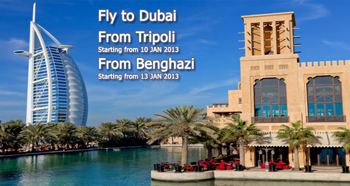
To be honest, in Afriqiyah Airlines our target is to be the best and we have all the potential to do so. Our problem is that sometimes the services we receive from others are not the best, for example in some cases it may be the airport facilities or the handling suppliers etc. However our main concern is aviation safety and high quality of service.
Is there anything you would like to add about Libya? What would you like to say to your counterparts abroad?
I think that in the past, people weren’t able to see the reality here in Libya, we were closed off. In the future I think people will see the reality. There are lovely tourist attractions in Libya, it is a very big country; it is more than an hour and a half flight from one side of the country to another. Libya has all kinds of tourist attractions, we have beaches, the dessert and the mountains and we also have the four seasons of weather. Libya is now in the hands of its people, which is something I believe we should really appreciate. People may be nervous because of the way they have lived for such a long time, but they can be sure the country is in our hands and it will improve for the better.